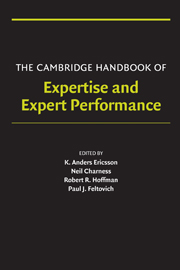Book contents
- Frontmatter
- Contents
- Acknowledgments
- Contributors
- PART I INTRODUCTION AND PERSPECTIVE
- 1 An Introduction to The Cambridge Handbook of Expertise and Expert Performance: Its Development, Organization, and Content
- 2 Two Approaches to the Study of Experts' Characteristics
- 3 Expertise, Talent, and Social Encouragement
- PART II OVERVIEW OF APPROACHES TO THE STUDY OF EXPERTISE – BRIEF HISTORICAL ACCOUNTS OF THEORIES AND METHODS
- PART III METHODS FOR STUDYING THE STRUCTURE OF EXPERTISE
- PART IV METHODS FOR STUDYING THE ACQUISITION AND MAINTENANCE OF EXPERTISE
- PART V DOMAINS OF EXPERTISE
- PART VI GENERALIZABLE MECHANISMS MEDIATING EXPERTISE AND GENERAL ISSUES
- Author Index
- Subject Index
- References
1 - An Introduction to The Cambridge Handbook of Expertise and Expert Performance: Its Development, Organization, and Content
from PART I - INTRODUCTION AND PERSPECTIVE
- Frontmatter
- Contents
- Acknowledgments
- Contributors
- PART I INTRODUCTION AND PERSPECTIVE
- 1 An Introduction to The Cambridge Handbook of Expertise and Expert Performance: Its Development, Organization, and Content
- 2 Two Approaches to the Study of Experts' Characteristics
- 3 Expertise, Talent, and Social Encouragement
- PART II OVERVIEW OF APPROACHES TO THE STUDY OF EXPERTISE – BRIEF HISTORICAL ACCOUNTS OF THEORIES AND METHODS
- PART III METHODS FOR STUDYING THE STRUCTURE OF EXPERTISE
- PART IV METHODS FOR STUDYING THE ACQUISITION AND MAINTENANCE OF EXPERTISE
- PART V DOMAINS OF EXPERTISE
- PART VI GENERALIZABLE MECHANISMS MEDIATING EXPERTISE AND GENERAL ISSUES
- Author Index
- Subject Index
- References
Summary
A significant milestone is reached when a field of scientific research matures to a point warranting publication of its first handbook. A substantial body of empirical findings, distinctive theoretical concepts and frameworks, and a set of new or adapted methods justify a unifying volume. The growth of this field is evident from the publication of a series of edited books on diverse sets of skills and expertise from many domains during the last several decades (Anderson, 1981; Bloom, 1985a; Chase, 1973; Chi, Glaser, & Farr, 1988; Ericsson, 1996a; Ericsson & Smith, 1991a; Feltovich, Ford, & Hoffman, 1997; Hoffman, 1992; Starkes & Allard, 1993; Starkes & Ericsson, 2003). And as in many other fields, the name of a branch of scientific study, in our case expertise and expert performance, often communicates the domain of studied phenomena.
Expert, Expertise, and Expert Performance: Dictionary Definitions
Encyclopedias describe an Expert as “one who is very skillful and well-informed in some special field” (Webster's New World Dictionary, 1968, p. 168), or “someone widely recognized as a reliable source of knowledge, technique, or skill whose judgment is accorded authority and status by the public or his or her peers. Experts have prolonged or intense experience through practice and education in a particular field” (Wikipedia, 2005). Expertise then refers to the characteristics, skills, and knowledge that distinguish experts from novices and less experienced people.
- Type
- Chapter
- Information
- Publisher: Cambridge University PressPrint publication year: 2006
References
- 104
- Cited by

